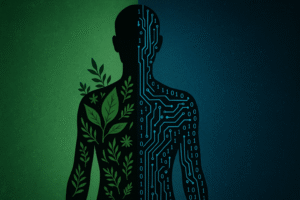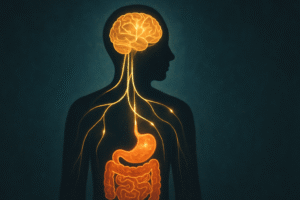Fun fact: The term “toxic positivity” saw a 450% spike in Google searches after the 2020 pandemic lockdowns — turns out, forced cheerfulness isn’t comforting during a global crisis.
Introduction: When Positivity Becomes a Problem
In a world that constantly tells us to “look on the bright side” and “stay positive,” it’s no surprise that many people feel pressure to plaster on a smile even when they’re falling apart inside. The phrase “It’s okay to not be okay” has become a popular counter-message, challenging the overwhelming rise of what psychologists call toxic positivity — the idea that individuals should remain optimistic regardless of how serious or challenging a situation may be.
Welcome to the toxic positivity trap — a dangerous emotional quicksand where acknowledging pain, sadness, or anxiety is seen as weakness, failure, or negativity. This blog dives into how this seemingly harmless mindset actually silences emotional truth, creates shame around vulnerability, and why allowing space for uncomfortable emotions is critical for mental health.
What Is Toxic Positivity, Really?
Toxic positivity is not just about being cheerful — it’s about forcing optimism to the point where other emotions are invalidated. It’s the reflexive “at least…” statement when someone shares bad news. It’s the hollow motivational poster that says, “Good vibes only.” It’s the Instagram influencer urging you to “manifest joy” while ignoring your pain.
At its core, toxic positivity minimises real emotional experiences in favour of artificial cheerfulness.
Examples of Toxic Positivity in Daily Life:
- Telling someone with depression to “just think happy thoughts.”
- Responding to a miscarriage with “everything happens for a reason.”
- Saying “you’ll be fine” instead of asking “how can I support you?”
What seems like encouragement can often shut down emotional expression, leaving people isolated, ashamed, and unheard.

Why Is It So Prevalent Today?
There are a few reasons why this problem has exploded in recent years:
Social Media’s Filtered Reality
Platforms like Instagram, TikTok, and Facebook (now part of Meta Platforms Inc., a technology company known for its social media and virtual reality products) promote curated lives full of smiles, success, and sunsets. When everyone else appears to be thriving, admitting to struggling feels like you’re the only one failing.
Corporate Wellness Culture
Companies like Google (a multinational technology company under Alphabet Inc. known for its search engine and digital products) and LinkedIn (a Microsoft-owned professional networking platform) often tout wellness initiatives while simultaneously glorifying hustle culture. The contradiction? You’re expected to meditate daily and work 60 hours a week.
Cultural Pressure
In India and many parts of Asia, expressing sadness or mental distress is often frowned upon. We’re taught to “adjust,” “stay strong,” or “think positive” — especially in joint family setups or rigid educational systems. Emotional suppression is considered a virtue.
The Mental Health Consequences
When people are denied the space to grieve, vent, or simply feel sad, the emotions don’t disappear — they just get buried.
Emotional Suppression Leads to:
Anxiety: When you’re not allowed to express pain, it leaks out as tension, panic, or obsessive thoughts.
Depression: Constantly faking happiness can leave you emotionally exhausted and numb.
Low Self-Esteem: Feeling like you’re “failing at positivity” adds another layer of shame.
Loneliness: If no one is being real, you feel like you’re the only one struggling.
In fact, studies from the American Psychological Association (APA) have shown that emotional avoidance is linked with poorer psychological health and higher levels of stress.
The Pandemic Unmasked Toxic Positivity
The COVID-19 pandemic was a collective trauma. Yet many were bombarded with messages like “use this time to grow,” “learn a new skill,” or “be grateful you’re alive.”
While gratitude is valuable, it shouldn’t be used to silence grief or fear. Many people lost loved ones, jobs, or peace of mind. Brushing it aside in favour of “good vibes” created deep emotional dissonance.
One viral example was the case of Mount Vernon’s choir outbreak — a tragic event where 87% of singers contracted the virus after a single practice. Despite being a real wake-up call about airborne disease transmission, some influencers insisted on focusing only on the “silver lining” of the lockdown — home workouts and baking bread — while ignoring public health grief and loss.
It’s Okay to Feel Bad: The Power of Emotional Honesty
True mental health isn’t about being happy all the time. It’s about being able to feel all your emotions — joy, anger, fear, sadness — without judgment.
Emotional honesty means:
- Saying “I’m not okay right now” without shame.
- Letting a friend cry without rushing to cheer them up.
- Acknowledging that pain and hope can coexist.
In her TED Talk “The Gift and Power of Emotional Courage,” psychologist Dr. Susan David explains that suppressing so-called “negative” emotions only strengthens their hold over us. Naming your emotions, on the other hand, is the first step to processing and healing.
The Cost of Always Being ‘Fine’
There’s a popular Indian phrase — “Sab theek hai” — which roughly translates to “Everything is fine.” It’s a cultural default response, even when things are far from okay.
We’re taught to present a façade of normalcy — to show up to work, to smile through heartbreak, to “move on” quickly. But what if that response is part of the problem?
When we don’t acknowledge our struggles:
- We make others feel they must hide theirs.
- We delay healing.
- We reinforce a system where silence is rewarded and vulnerability is punished.
How to Avoid Falling Into the Trap
If you’ve ever dismissed your own feelings or someone else’s because it felt “too negative,” you’re not alone. The key is to practice emotional validation.
Try This Instead:
| Toxic Positivity | Emotionally Healthy Alternative |
| “You’ll get over it.” | “That sounds really hard. I’m here for you.” |
| “Just stay positive.” | “It’s okay to feel upset. What do you need right now?” |
| “Others have it worse.” | “Your pain is valid, even if others are struggling too.” |
Let’s replace empty affirmations with empathy.
Conclusion: Let’s Normalise Not Being Okay
The human experience isn’t meant to be filtered, curated, or constantly joyful. Grief, heartbreak, frustration, and fear are all part of a meaningful life. Pretending otherwise is not only dishonest — it’s harmful.
The next time someone opens up about their struggles, resist the urge to fix, cheer up, or find a silver lining. Just listen. Just feel. Just be.
Because sometimes, the most positive thing you can do is admit that things aren’t positive right now.
Author’s Note
As someone who has navigated personal grief while being told to “smile through it,” this topic is deeply personal. I hope this blog helps you give yourself — and others — permission to feel everything without shame. Because you’re not alone, and you don’t have to fake it to be strong.
G.C., Ecosociosphere contributor.




